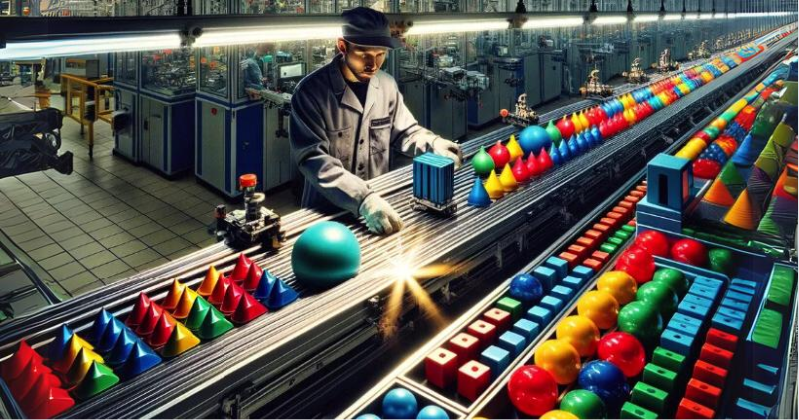This article was written by Ken Leaver who comes from a product & commercial background. He has founded multiple companies and held senior product positions at SEA tech companies like Lazada and Pomelo Fashion.
Now Ken runs his own agency that helps early stage startups with content and traction called End Game.
Guest Author: Ken Leaver
I was having a chat with someone recently and was trying to explain this idea. In essence what I mean is that you picture yourself like a person working on an assembly line.
You should keep producing a steady flow of outputs.
And so you make sure that what you work on first are the top priorities. But at some point you have done all you can do on those initiatives and are now blocked by others doing their tasks.
So now you should work on lower priorities. Perhaps this even means kicking off things that you planned to start a few weeks from now. But you kick it off.
And by kicking it off you start thinking about what you need, who you need to be involved, etc.
Then when your top priority projects become unblocked you work on your tasks to progress them again till you are blocked again. And then return to the lower priorities.
You keep repeating like this like a person working on an assembly line.
And if you do… and you follow a system like mine in a disciplined way, you will always outperform a person who only works on top priorities.
Now let’s dig in so I can explain why and how.

First a refresher on my system
I use a system that I like to call ‘everything is a task’ in which literally everything that takes anyone on the team >20 minutes is reflected as a task on a clickup board.
It has an assignee, a description, a due date (if it is started), and updates as comments.
Any work that anyone does on any tasks should be captured as an update to a task (eg. a status change, a comment, etc). And everyone that is relevant to that task is added as a follower so that they are getting these updates.
You break down all projects into these discrete tasks.
Or at least you break down as much you can already predict needs to be done. I like to call this ‘whatever is in your headlights.’
Meaning that you don’t need to try to predict absolutely everything that needs to be done in a project.. but rather just the things that you already see will need to be done in the next couple of weeks.

In my system you always work in priority order
In this system you should always work on tasks in priority order. Meaning that you always do as much as you can on those projects first.
But at some point they typically get blocked by others who need to do their part.
So then you start working on lower priority tasks. You kick off projects that you will need to do in the future, etc.
By doing this you are prepping them. And by starting early you start to bite into some of the things that will take the longest time.
I often find that there are components of the project which have lots of lag time. For example you are dependent on a different team or an external partner. And so it’s best to kick off those things early because you don’t know exactly how long it will take them.
And so if you do this efficiently… you not only complete your priority tasks on time, but rather you are also prepping the next set of priorities.
All of this sounds logical and probably not groundbreaking stuff.. but in my experience very few people do it. Now let’s explore why.

Most people try to work with a narrow focus
Folks love to brag about how focused they are. And that this is one of their core operating principles. I usually roll my eyes when I hear stuff like this.
There are a lot of reasons for most people maintaining a narrow focus. But the primary reason in my experience is that they lack tight organization skills.
So if they put too many balls in the air they start dropping the most important ones.
When you don’t have all your projects and tasks written down in a very structured and clear way… context switching becomes very ‘expensive’.
Meaning if you want to switch from one project to another one.. you need to start to rethink about where you were in this other project and what you need to do next.
I had this same problem before i switched to my current system and so it’s a problem i know very well.

I reduced ‘switching costs’ to close to zero
These days I would say my friction from switching projects is next to ZERO. I switch between different projects constantly and am pretty much NEVER trying to rethink where I was or what i need to do next.
Why?
Simple. Because i broke all projects down into discrete tasks and so i’m just jumping from task to task.
But each task has all the context i need to complete it. And so I do not need to think about the larger project. I simply execute the task at hand.
Then perhaps i move to a different task of a different project.
In one of my Clickup workspaces i have about five different projects in it. These are five projects that pretty much have nothing to do with one another and even have different stakeholders.
But notifications on the tasks on all of them come to a single Clickup inbox. And so I might be sitting down to clear my inbox and i’m clearing tasks from five different projects that are all mixed together.
I’m literally context switching every couple of minutes. The old ‘management gurus’ would probably be rolling in their graves at this. Haha
But reality is.. that the human brain is actually very good at operating like this once it is used to it.

The advantages of working like this
The key questions you need to ask about whether this way of doing things is better or not is…. do you get more shit done? And does it get done with quality and on time?
And here is where after 3-4 years I can say unequivocally: Yes, Yes, and Yes.
Once your team gets used to operating like this you just know that the system is such that you can start 2-3x more projects at the same time… and still land the most important ones on time. While progressing on the rest.
This way of operating just gives you a major unfair advantage. One that helps you close the gap on areas where you may have disadvantages.
Maybe your company has less money.
Maybe you have less experience.
Maybe you have less connections.
But if you can execute consistently faster and better than you are always still in the game with a good shot of winning it.
At least that’s how I see it.
“I don’t wanna play yo’ game… I wanna win by changing the rules.”









